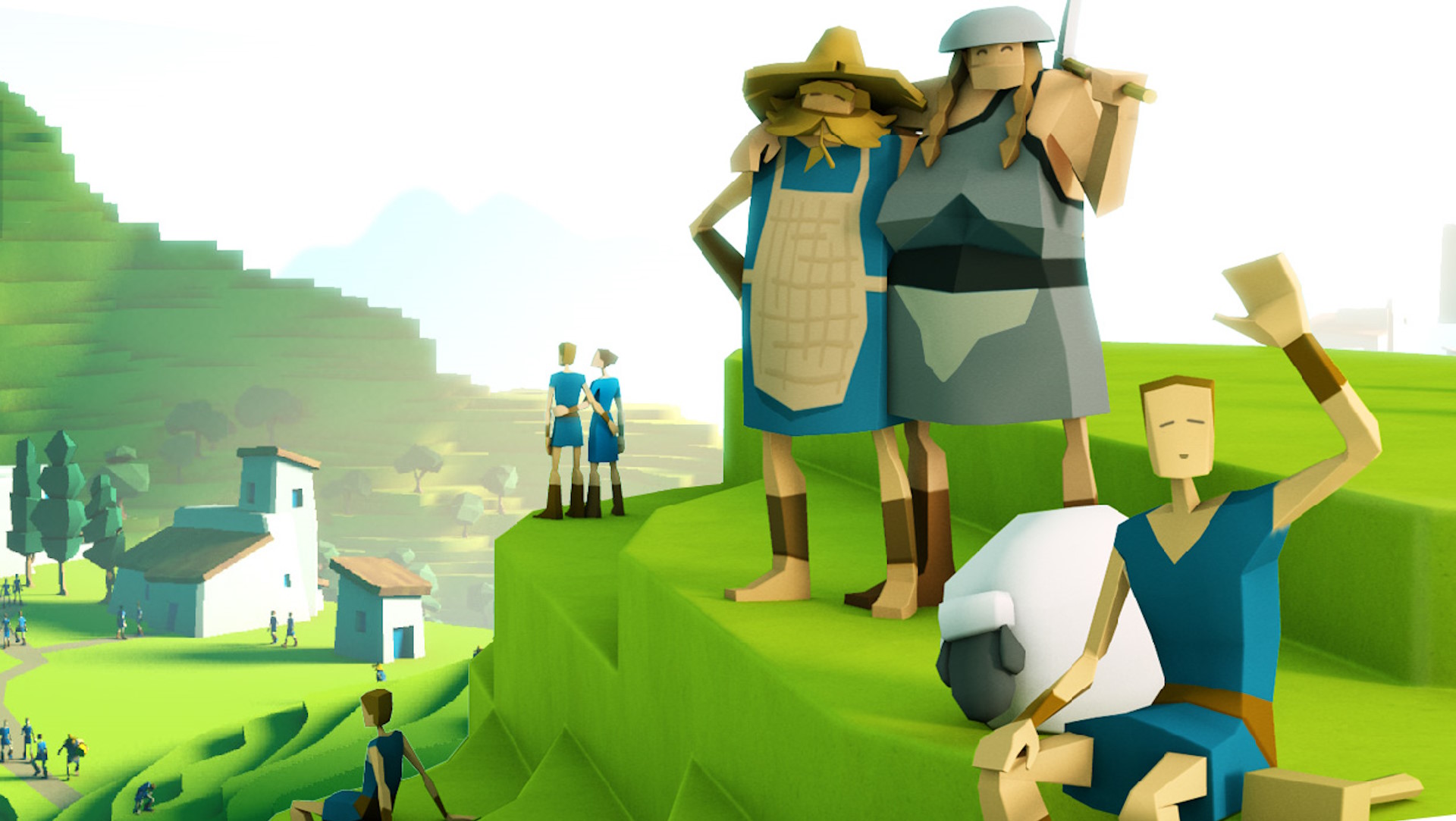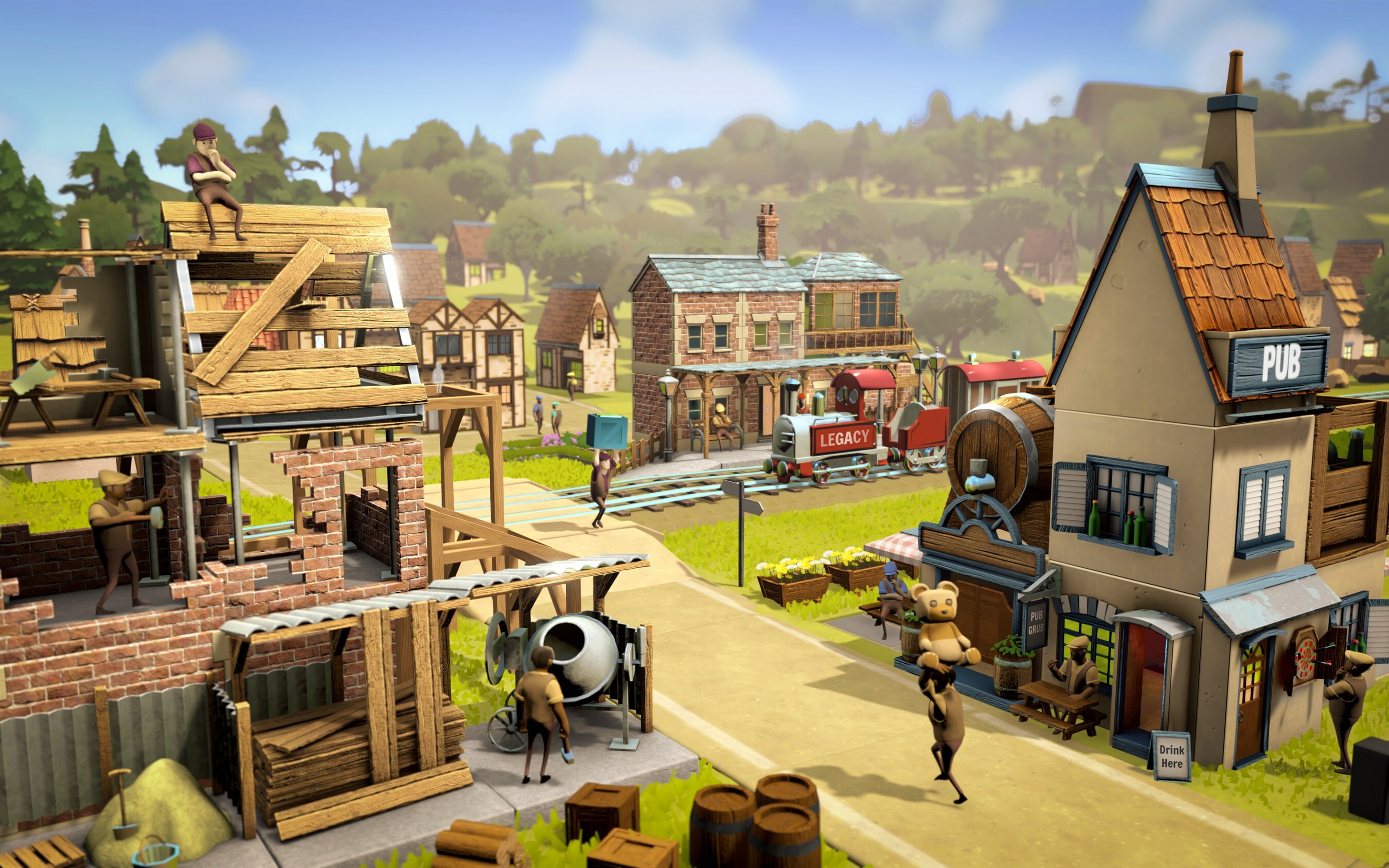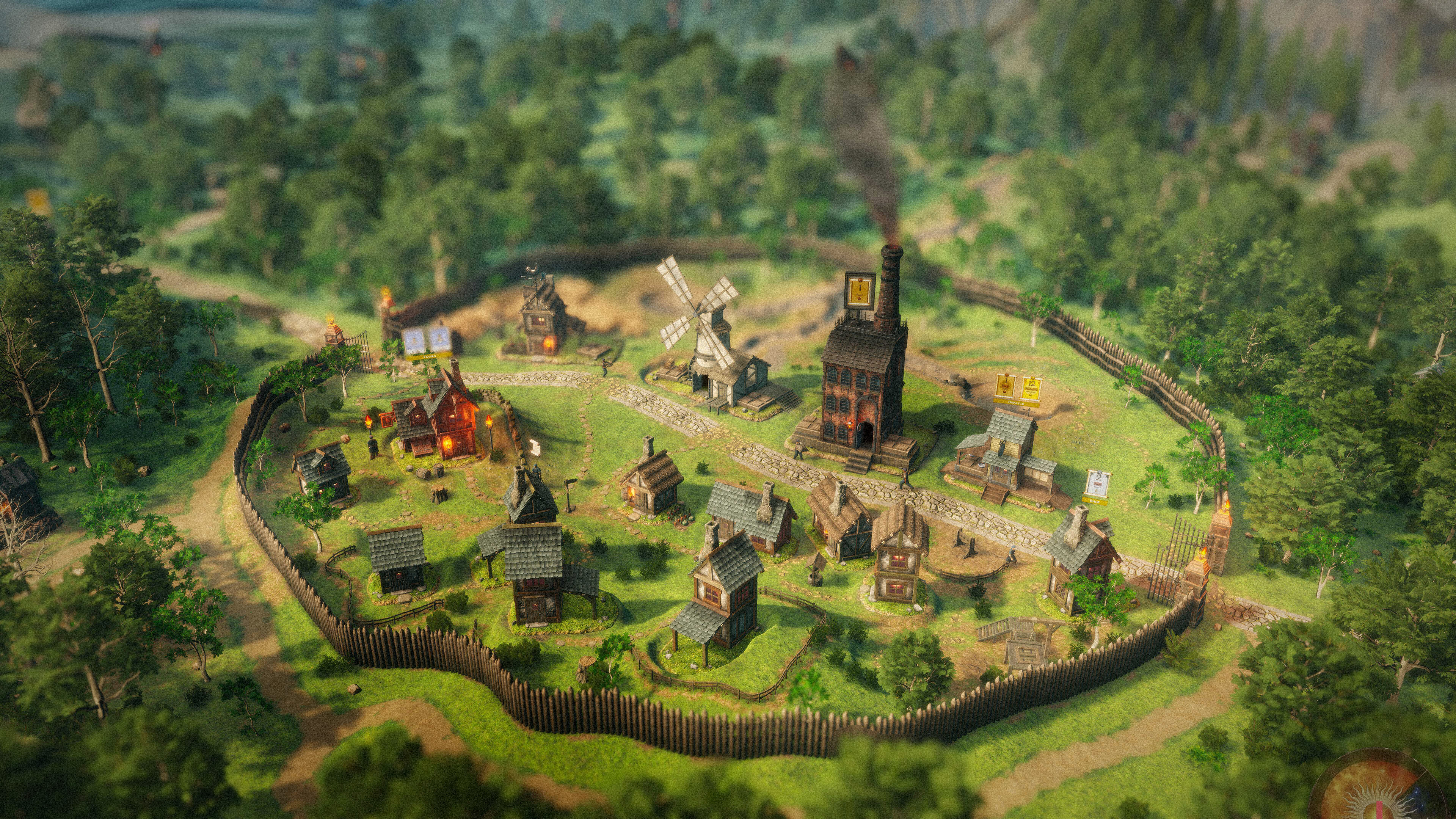Peter Molyneux is without delay often known as a legendary recreation designer and as a legendary bullshitter. He is credited with creating the “god recreation” style with 1989’s Populous, and led the Fable RPGs of the 2000s. A lot of his video games had been hits, and a few are thought to be classics. His private repute hasn’t fared so properly.
Earlier this week at Gamescom, Molyneux introduced a brand new god recreation referred to as Masters of Albion, and there are causes to suspect it will not be any good. The final recreation put out by his studio, 22cans, was a blockchain enterprise sim that earned its cash by promoting “land NFTs.” And the most important recreation the studio put out earlier than that, crowdfunded god recreation Godus, is not even accessible for buy on PC anymore.
Among the many reactions to the announcement had been pleas to snuff out any emergence of a Molyneux redemption story. He hasn’t actually answered for failing to ship all the pieces the Godus Kickstarter backers paid for, and maybe worse, he promised an 18-year-old child godhood and gave him squat (extra on that bizarre saga under).
The previous decade of Molyneux’s profession has been stuffed with blunders, however whereas studying these takes I used to be pondering, alright, true, however Masters of Albion does look sort of enjoyable. Perhaps I am simply nostalgic for considered one of my favourite Molyneux video games, Black & White, however I simply love little greedy hand cursors you should utilize to fling your topics round. Is it mistaken to provide Masters of Albion an opportunity, to not redeem Molyneux within the eyes of aggrieved Kickstarter backers, however simply to be a enjoyable recreation?
My automated response was, nah, it is wonderful, however that is not essentially the most satisfying reply, so to work out why I really feel that method, I’ve examined the historical past of Molyneux’s profession under, as briefly as I may handle (which is admittedly not very briefly). Provided that I used to be a teen when Black & White launched in 2001, this may additionally be useful for anybody who reacted to Molyneux’s ONL look with the query, “Who’s that?”
Acorns and oak timber
Following Molyneux’s success with ’90s sims like Populous, Theme Park, and Dungeon Keeper, he co-founded Lionhead and developed Black & White earlier than shifting onto the Fable RRG collection. This is not the place Molyneux’s behavior of creating wild guarantees started—an amazing 2014 Kotaku characteristic traces that habits again to the beginning—nevertheless it’s right here that I recall his repute as a free cannon pitchman actually solidifying a topic of web mockery and derision.
Amongst many different examples, the designer famously instructed press that, in Fable, gamers would have the ability to plant an acorn and witness it develop into an oak tree as years of in-game time handed. That wasn’t true, and the declare grew to become one of the repeated Molyneuxisms.
Molyneux caught warmth for these verbal wanderings—he was referred to as a liar and a scammer on boards—however individuals additionally cherished Black & White and Fable. They had been widespread video games and important hits. And a few of Molyneux’s lofty remarks had been genuinely forward of the curve. In the identical yr that Halo 3 and Name of Responsibility 4: Fashionable Warfare had been the best-selling Xbox 360 video games, Molyneux was hyping up Fable 2 by speaking about love, intercourse, and companionship.
For the individuals I used to be round on the time, Molyneux was seen as endearingly over-excited about his personal concepts, an incorrigible scamp whose phrases you could not take too severely. After he left Lionhead in 2012 and based a brand new unbiased studio, 22cans, nevertheless, Molyneux’s relationship with the press and public dramatically declined.
Curiosity: Molyneux’s bizarre dice
Molyneux took his hype-building expertise to a different stage at 22cans. The corporate’s first recreation, Curiosity, was a cellular app that contained a dice product of billions of smaller cubes. Gamers, working collectively, tapped on the small cubes to destroy them, slowly revealing the layers under. We had been instructed that whoever reached the middle of the dice first would win a “life-changing” prize, and Molyneux framed Curiosity’s microtransactions, which allowed gamers to purchase cube-smashing instruments, as simply part of the social experiment.
“This isn’t a money-making train, it’s a check concerning the psychology of monetization,” he stated on the time.

Did we purchase it? As I recall, the entire thing was thought to be bizarre, novel, and kind of ridiculous—basic Molyneux—however we did need to know what was within the dice. How may we not? Molyneux’s repute for overpromising meant that if the prize actually sucked, he was going to be completely lambasted for getting us labored up about it. And if the prize actually was wonderful, we clearly wished to know what Willy Wonka had in retailer.
For those who weren’t following it on the time, you’ll be able to most likely guess the way it turned out. When an 18-year-old child named Bryan Henderson clicked the ultimate dice in 2013, it rapidly grew to become obvious that there was no “life-changing” prize, besides within the technical sense that his life was briefly, mildly disrupted.
Godus: The Kickstarted god recreation
The dice’s treasure was a particular “God of Gods” multiplayer function in 22cans’ first correct recreation, a Kickstarter-funded successor to Populous referred to as Godus, in addition to a proportion of the sport’s income. That will’ve been an unbelievable prize if Godus had been the following World of Warcraft, and Henderson was about to rule over tens of millions of gamers whereas incomes sufficient passive earnings to fund any way of life he wished. It even would’ve been a fairly cool prize if Godus had been a modest success. However on PC, it was a dud, and the multiplayer options that might’ve made Henderson an in-game god had been by no means even completed.

In a 2015 interview with Eurogamer, Henderson stated that 22cans invited him to their workplace as soon as, after which ignored him. Molyneux apologized on the time for the dearth of communication, and insisted that they had been nonetheless engaged on these Godus multiplayer options, regardless that by that time they’d introduced one other recreation.
Final yr, Godus was faraway from sale on Steam. Henderson by no means received his prize. The Kickstarter backers did not get all of the rewards promised by the marketing campaign. A free-to-play cellular model of Godus made with the involvement of an exterior writer, regardless of the purpose of the Kickstarter being “no publishers,” continues to obtain updates. Molyneux stated this week that the cellular recreation is “amazingly widespread,” nevertheless it is not a alternative for the finished PC recreation backers wished.
In an notorious 2015 Rock Paper Shotgun interview by which he was requested if he is “a pathological liar,” Molyneux stated that he had by no means knowingly lied. He stated he’d needed to change course and make sacrifices out of necessity, as a result of making one thing new is unpredictable and onerous: “Making a pc recreation that is entertaining and that is unbelievable and that is wonderful is sort of unattainable, it is virtually unattainable to do.”
It isn’t an unfamiliar story—numerous Kickstarted video games have been delayed, gone over price range, and underdelivered, and the notion that ‘recreation improvement is difficult’ is repeated continually—however at that time, Molyneux was out of goodwill to show in for forgiveness.
Additionally, there was that NFT recreation

For his subsequent huge transfer, Molyneux and 22cans teamed up with blockchain firm Gala Video games to launch a Web3 recreation referred to as Legacy. If everybody’s already mad at you, what is the hurt in slightly NFT recreation, proper?
Legacy is a enterprise sim that, on the peak of NFT fever in 2021, began promoting “Land NFTs” to speculators wanting to get in on the Web3 gaming revolution that they stored saying was taking place, and that was clearly not.
On this week’s interview with Eurogamer, Molyneux admitted that he by no means absolutely understood the “play-to-earn” financial mannequin (me both!) and has since determined that it “would not actually work financially, or in gameplay phrases.” He stated that he’d grow to be disillusioned with the free-to-play mannequin, and that Gala Video games bought him on the concept that blockchain could be the following huge factor.
The individuals who purchased these NFTs didn’t get wealthy, however for Molyneux and 22cans, it would not seem like the venture was a monetary mistake. Molyneux says they did not make $54 million off the sport like some reported, however did make sufficient to fund Masters of Albion, the brand new god recreation Molyneux introduced on stage with Geoff Keighley at Opening Evening Reside this week.
And now: Masters of Albion

Watch On
So that is the rating: a Kickstarter venture that did not absolutely materialize, a winner who’s nonetheless owed godhood, a brand new recreation being funded by the poor funding decisions of Web3’s true believers, and Molyneux persevering with to be Molyneux.
After failing to ship an entire PC model of Godus, it was definitely artless for Molyneux to get on stage this week and surprise aloud what the hell he’d been doing “messing round on cellular.” Your backers had been asking the identical query!
It is also straightforward to be suspicious of Masters of Albion, which seems remarkably just like the NFT recreation that funded it. Molyneux is aware of he has to beat his repute right here: “It is received to enter early entry and be actually fucking wonderful,” he instructed Eurogamer.
If Molyneux had been a serial crowdfunder who repeatedly failed to finish tasks, I would most likely roll my eyes and depart it there. However he is not. Godus is the one venture 22cans has crowdfunded, and drawing a direct line between it and people previous Fable interviews misrepresents how individuals truly felt concerning the Fable video games. They had been widespread and praised by critics, not crappy RPGs bought totally on false guarantees.

If something, the notorious Fable interviews make it extra plausible that Molyneux genuinely felt that 22cans may do what he stated it may with Godus. A man recognized for falling in love with cool concepts that he cannot ship on is de facto not who you need with the keys to a Kickstarter web page, and it would not seem like the studio plans to repeat that irresponsible mistake.
It is disappointing that there is not any remark from Molyneux this week on what he will do, if something, to make good with upset backers. I’ve requested the studio for an interview, and have not heard again.
However 22cans is hardly the one developer to have ever botched a crowdfunding marketing campaign, and we’re in no hazard of in some way being tricked right here. Both the brand new recreation might be enjoyable or it will not. Whereas I do not suggest backing the Kickstarter tasks of chaotic individuals like Molyneux, they do sometimes make cool video games with their associates.
“Typically he’ll shoot for the celebs when he tries to instill ambition in his staff,” stated Gary Carr, who labored with Molyneux for 20 years, in that 2014 Kotaku characteristic. “And if it would not all the time work, it may be taunted again at him. However I nonetheless bear in mind these individuals who he dragged out of the gutters to some extent and made them into nice builders. So I are likely to have a way more balanced view of that. It is one thing he cannot change off. He is formidable, he sells goals, he sells individuals to themselves. So due to this fact if it really works, it is nice, if it would not all the time work, then I feel that is simply the prospect you are taking.”







